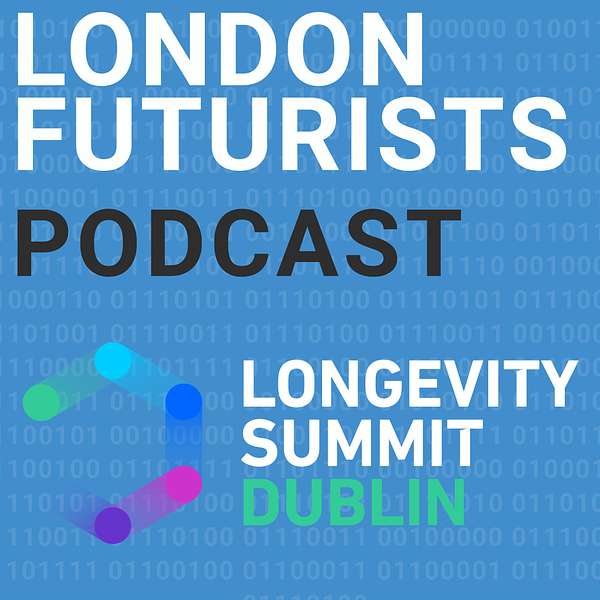
London Futurists
Anticipating and managing exponential impact - hosts David Wood and Calum Chace
Calum Chace is a sought-after keynote speaker and best-selling writer on artificial intelligence. He focuses on the medium- and long-term impact of AI on all of us, our societies and our economies. He advises companies and governments on AI policy.
His non-fiction books on AI are Surviving AI, about superintelligence, and The Economic Singularity, about the future of jobs. Both are now in their third editions.
He also wrote Pandora's Brain and Pandora’s Oracle, a pair of techno-thrillers about the first superintelligence. He is a regular contributor to magazines, newspapers, and radio.
In the last decade, Calum has given over 150 talks in 20 countries on six continents. Videos of his talks, and lots of other materials are available at https://calumchace.com/.
He is co-founder of a think tank focused on the future of jobs, called the Economic Singularity Foundation. The Foundation has published Stories from 2045, a collection of short stories written by its members.
Before becoming a full-time writer and speaker, Calum had a 30-year career in journalism and in business, as a marketer, a strategy consultant and a CEO. He studied philosophy, politics, and economics at Oxford University, which confirmed his suspicion that science fiction is actually philosophy in fancy dress.
David Wood is Chair of London Futurists, and is the author or lead editor of twelve books about the future, including The Singularity Principles, Vital Foresight, The Abolition of Aging, Smartphones and Beyond, and Sustainable Superabundance.
He is also principal of the independent futurist consultancy and publisher Delta Wisdom, executive director of the Longevity Escape Velocity (LEV) Foundation, Foresight Advisor at SingularityNET, and a board director at the IEET (Institute for Ethics and Emerging Technologies). He regularly gives keynote talks around the world on how to prepare for radical disruption. See https://deltawisdom.com/.
As a pioneer of the mobile computing and smartphone industry, he co-founded Symbian in 1998. By 2012, software written by his teams had been included as the operating system on 500 million smartphones.
From 2010 to 2013, he was Technology Planning Lead (CTO) of Accenture Mobility, where he also co-led Accenture’s Mobility Health business initiative.
Has an MA in Mathematics from Cambridge, where he also undertook doctoral research in the Philosophy of Science, and a DSc from the University of Westminster.
London Futurists
Longevity Summit Dublin: four new mini-interviews
Use Left/Right to seek, Home/End to jump to start or end. Hold shift to jump forward or backward.
This episode, like the previous one, consists of a number of short interviews recorded at the Longevity Summit Dublin between 17th and 20th August, featuring a variety of different speakers from the Summit.
In this episode, we'll hear first from Matt Kaeberlein, the CEO of a company called Optispan, following a 20 year period at the University of Washington studying the biological mechanisms of aging and potential interventions to improve healthspan. Among other topics, Matt talks to us about the Dog Aging Project, the Million-Molecule Project, and whether longevity science is at the beginning of the end or the end of the beginning.
Our second speaker is João Pedro de Magalhães who is the Chair of Molecular Biogerontology at the University of Birmingham, where he leads the genomics of aging and rejuvenation lab. João Pedro talks to us about the motivation to study and manipulate the processes of aging, and his work to improve the low-temperature cryopreservation of human organs. You may be surprised at how many deaths are caused by the present lack of such cryopreservation methods.
Third is Steve Horvath, who has just retired from his position as a professor at the University of California, Los Angeles, and is now a Principal Investigator at Altos Labs in Cambridge. Steve is known for developing biomarkers of aging known as epigenetic clocks. He describes three generations of these clocks, implications of mammalian species with surprisingly long lifespans, and possible breakthroughs involving treatments such as senolytics, partial epigenetic reprogramming, and altering metabolic pathways.
The episode rounds off with an interview with Tom Lawry, Managing Director for Second Century Tech, who refers to himself as a recovering Microsoft executive. We discuss his recent bestselling book "Hacking Healthcare", what's actually happening with the application of Artificial Intelligence to healthcare (automation and augmentation), the pace of change regarding generative AI, and whether radiologists ought to fear losing their jobs any time soon to deep learning systems.
Selected follow-ups:
https://longevitysummitdublin.com/speakers/
https://optispanlife.com/
https://orabiomedical.com/
https://rejuvenomicslab.com/
https://oxfordcryotech.com/
https://horvath.genetics.ucla.edu/
https://altoslabs.com/team/principal-investigators-san-diego/steven-horvath/
https://www.tomlawry.com/
https://www.taylorfrancis.com/books/mono/10.4324/9781003286103/hacking-healthcare-tom-lawry
Music: Spike Protein, by Koi Discovery, available under CC0 1.0 Public Domain Declaration
Elevate how you lead with insight from today’s most influential executives.
Listen on: Apple Podcasts Spotify

